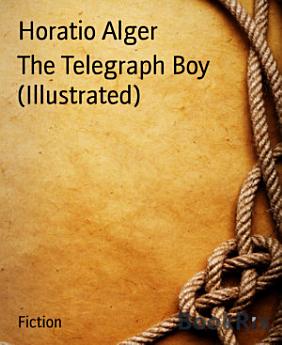The Telegraph Boy (Illustrated)
tra 2014. · BookRix
E-knjiga
164
str.
family_home
Ispunjava uvjete
info
reportOcjene i recenzije nisu potvrđene Saznajte više
O ovoj e-knjizi
"I have two children," she said, "a daughter and a son. The son has recently graduated from college, and is now travelling in Europe. My daughter is now twenty-six years of age. She was beautiful, and our social position was such that my husband, who is a proud man, confidently anticipated that she would make a brilliant match. But at the age of nineteen Ellen fell in love with a clerk in my husband's employ. He was a young man of good appearance and character, and nothing could be said against him except that he was poor. This, however, was more than enough in Mr. Graham's eyes. When Lawrence Brent asked for the hand of our daughter, my husband drove him from the house with insult, and immediately discharged him from his employ. Ellen was high-spirited, and resented this treatment of the man she loved. He soon obtained a place quite as good as the one he had lost, and one day Ellen left the house and married him. She wrote to us, excusing her action, and I would gladly have forgiven her; but her father was obdurate. He forbade my mentioning her name to him, and from that day to this he has never referred to her.
In late-nineteenth-century New York City, fifteen-year-old Frank Kavanagh's job as messenger boy brings him many adventures, new friendships, and eventually a great improvement in his fortunes.
Horatio Alger, Jr. (January 13, 1832 – July 18, 1899) was a prolific 19th-century American author, best known for his many juvenile novels about impoverished boys and their rise from humble backgrounds to lives of middle-class security and comfort through hard work, determination, courage, and honesty. His writings were characterized by the "rags-to-riches" narrative, which had a formative effect on America during the Gilded Age. Alger's name is often invoked incorrectly as though he himself rose from rags to riches, but that arc applied to his characters, not to the author. Essentially, all of Alger's novels share the same theme: a young boy struggles through hard work to escape poverty. Critics, however, are quick to point out that it is not the hard work itself that rescues the boy from his fate, but rather some extraordinary act of bravery or honesty, which brings him into contact with a wealthy elder gentleman, who takes the boy in as a ward. The boy might return a large sum of money that was lost or rescue someone from an overturned carriage, bringing the boy—and his plight—to the attention of some wealthy individual. It has been suggested that this reflects Alger's own patronizing attitude to the boys he tried to help.
In late-nineteenth-century New York City, fifteen-year-old Frank Kavanagh's job as messenger boy brings him many adventures, new friendships, and eventually a great improvement in his fortunes.
Horatio Alger, Jr. (January 13, 1832 – July 18, 1899) was a prolific 19th-century American author, best known for his many juvenile novels about impoverished boys and their rise from humble backgrounds to lives of middle-class security and comfort through hard work, determination, courage, and honesty. His writings were characterized by the "rags-to-riches" narrative, which had a formative effect on America during the Gilded Age. Alger's name is often invoked incorrectly as though he himself rose from rags to riches, but that arc applied to his characters, not to the author. Essentially, all of Alger's novels share the same theme: a young boy struggles through hard work to escape poverty. Critics, however, are quick to point out that it is not the hard work itself that rescues the boy from his fate, but rather some extraordinary act of bravery or honesty, which brings him into contact with a wealthy elder gentleman, who takes the boy in as a ward. The boy might return a large sum of money that was lost or rescue someone from an overturned carriage, bringing the boy—and his plight—to the attention of some wealthy individual. It has been suggested that this reflects Alger's own patronizing attitude to the boys he tried to help.
Ocijenite ovu e-knjigu
Recite nam što mislite.
Informacije o čitanju
Pametni telefoni i tableti
Instalirajte aplikaciju Google Play knjige za Android i iPad/iPhone. Automatski se sinkronizira s vašim računom i omogućuje vam da čitate online ili offline gdje god bili.
Prijenosna i stolna računala
Audioknjige kupljene na Google Playu možete slušati pomoću web-preglednika na računalu.
Elektronički čitači i ostali uređaji
Za čitanje na uređajima s elektroničkom tintom, kao što su Kobo e-čitači, trebate preuzeti datoteku i prenijeti je na svoj uređaj. Slijedite detaljne upute u centru za pomoć za prijenos datoteka na podržane e-čitače.








